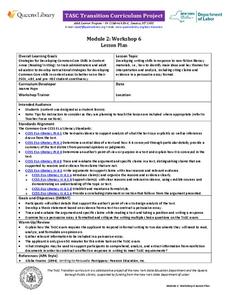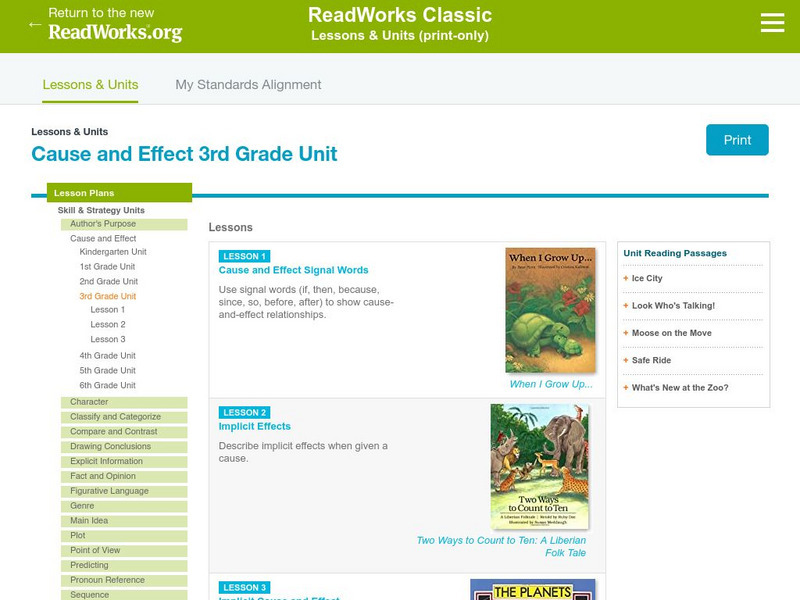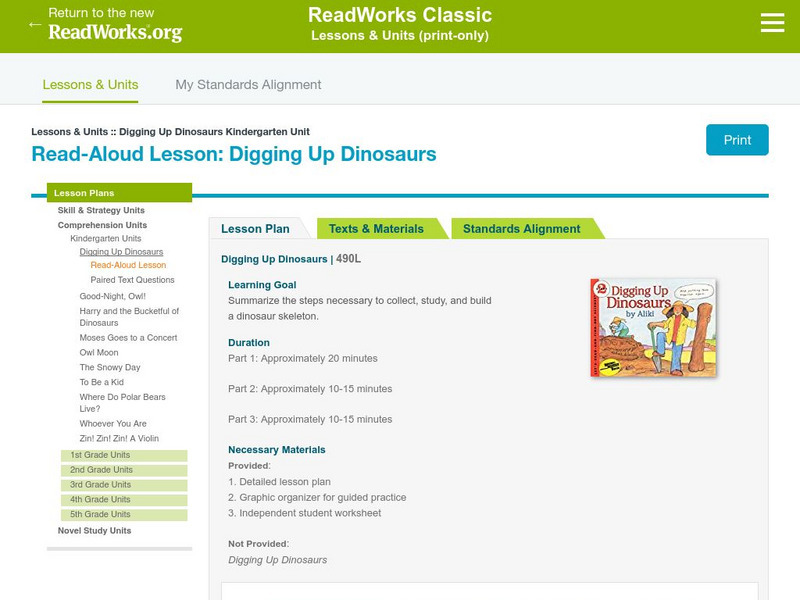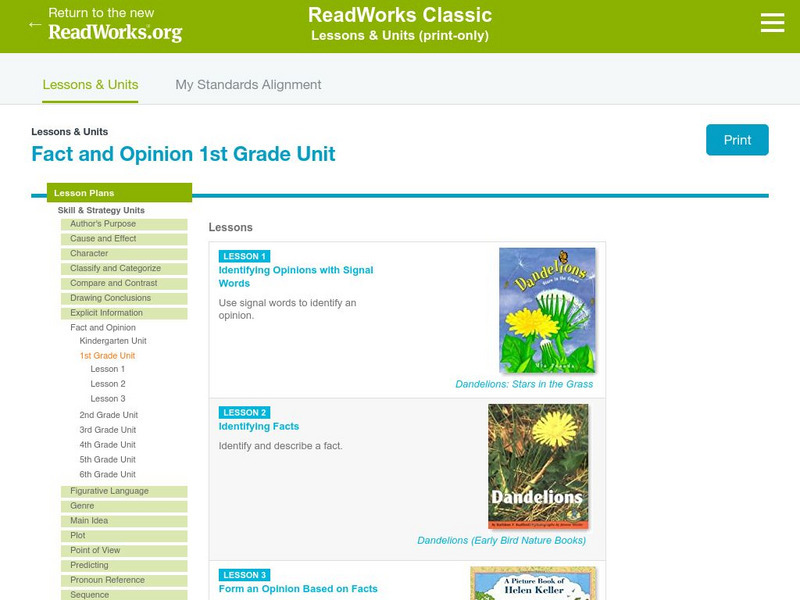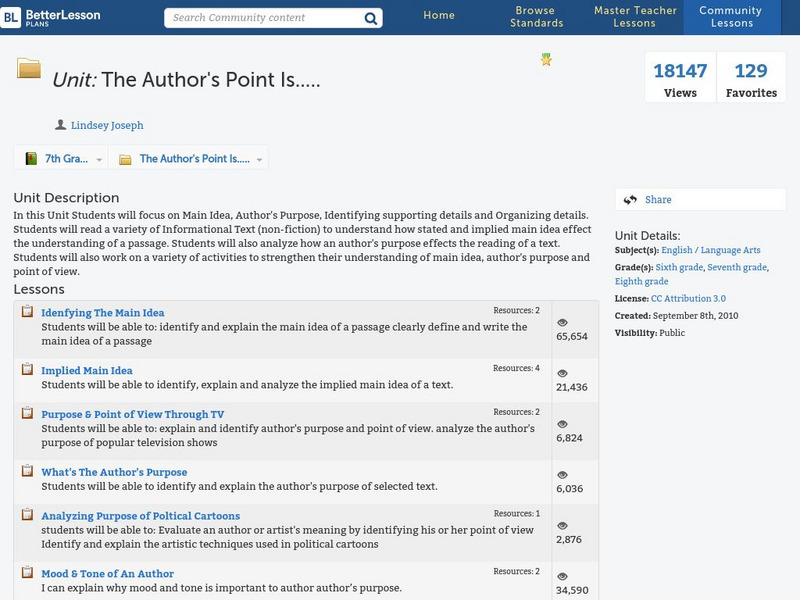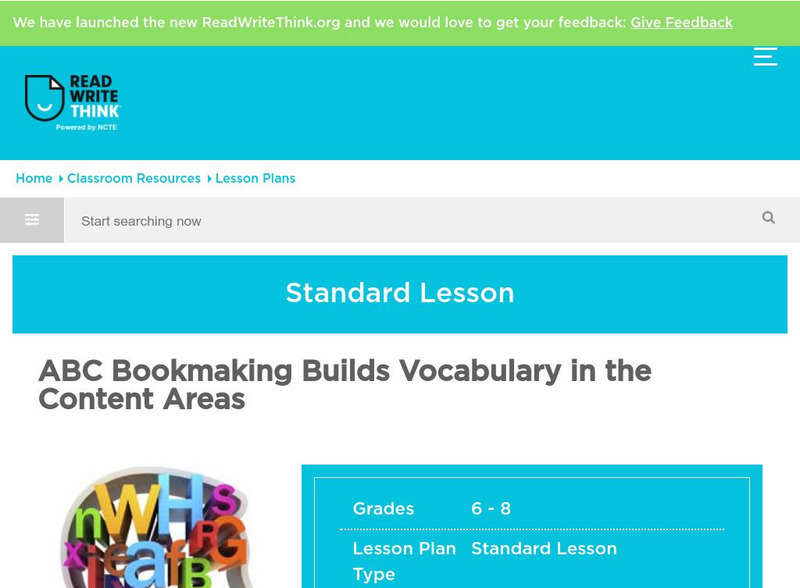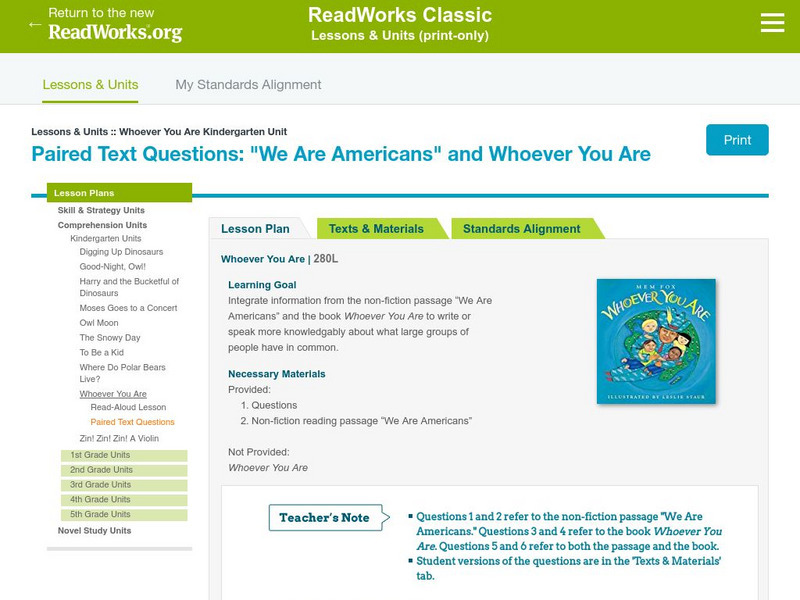EngageNY
TASC Transition Curriculum: Workshop 6
Is a college education necessary for success in today's world? The class investigates the question, along with others at the end of the sixth workshop in a 15-part series. The instructional activity has four parts with multiple...
EngageNY
TASC Transition Curriculum: Workshop 12
How can opinions slant facts? Workshop participants learn how to examine primary and secondary sources and identify the author's point of view. They also examine how visual art impacts the meaning and rhetoric of sources. Full of...
New York State Education Department
TASC Transition Curriculum: Workshop 5
Are video games sports? Pupils investigate this question as well as various nonfiction selections to learn more about claims and the support that defines them. All of the selections mimic the rigor on state tests and encourage close...
Better Lesson
Better Lesson: Analyzing Text Complexity of Non Fiction Sources
This instructional activity will help students read and comprehend nonfiction, specifically biographies, through determining criteria for text complexity. Included is a PDF and Smart Notebook titled Determining Text Complexity, and an...
South Carolina Educational Television
Know It All: Non Fiction Text Features
Fifth graders will use non-fiction books to identify and explain how text features help them as individual readers.
ReadWriteThink
Read Write Think: Diagram It! Identifying, Comparing & Writing About Non Fiction
Introduce your students to the different types of non-fiction such as biographies, biographies, and informative books. Students will use graphic organizers, peer interaction, and hands-on experiences to further understanding of this lesson.
Read Works
Read Works: Grade 2: Three Lesson Unit: Genre
[Free Registration/Login Required] A series of three lesson plans designed to teach students to compare and contrast fiction and non-fiction, identify the characteristics of non-fiction, and use guide words to locate topics in an...
Read Works
Read Works: Cause and Effect 3rd Grade Unit
[Free Registration/Login Required] A three-instructional activity unit on cause and effect. Learners learn to use signal words to identify cause and effect relationships and to describe possible effects when given a cause in fiction....
Read Works
Read Works: Read Aloud Lesson: Digging Up Dinosaurs
[Free Registration/Login Required] Teachers will read "Digging Up Dinosaurs" using the close reading technique. Young scholars will use graphic organizers to summarize the steps necessary to collect, study, and build a dinosaur skeleton.
Read Works
Read Works: Explicit Information 3rd Grade Unit
[Free Registration/Login Required] A two-lesson unit in which students learn how to identify explicit information in non-fiction text by creating questions and then reading the text to find answers. Students also use explicit information...
Read Works
Read Works: Fact and Opinion 1st Grade Unit
[Free Registration/Login Required] A three-lesson unit on fact and opinion through which students learn how to identify opinions through signal words, identify facts in a non-fiction text, and use facts to help them formulate opinions of...
Read Works
Read Works: Fourth Grade: Three Lesson Unit: Compare and Contrast
[Free Registration/Login Required] A three-lesson plan unit on comparing and contrasting through which students compare and contrast two non-fiction articles and two editorials, and write a compare and contrast essay. With free login,...
Texas Education Agency
Texas Gateway: Hyperbole and Understatement (English Ii Reading)
[Accessible by TX Educators. Free Registration/Login Required] In this lesson, you will learn to recognize hyperbole and understatement in nonfiction. Good examples also appear in other forms of writing such as fiction and poetry, but we...
ReadWriteThink
Read Write Think: Question and Answer Books From Genre Study to Report Writing
Contains plans for eight lessons that explore Question and Answer Books and ask students to do research in order to write their own. In addition to objectives and standards, these instructional plans contain links to sites used in the...
Better Lesson
Better Lesson: Unit: The Author's Point Is
Students will focus on Main Idea, Author's Purpose, Identifying supporting details and Organizing details. Students will read a variety of Informational Text (non-fiction) to understand how stated and implied main idea effect the...
CommonLit
Common Lit: Units: Teaching Units
Complete teaching units (12) by grade level. CommonLit units are crafted to be both engaging and rigorous, featuring a variety of literary and informational texts from diverse sources. Reading, writing, and discussion are prioritized in...
Yale University
Biographies for Change in a Time of Conformity
Reading non-fiction and perhaps particularly biography is a skill that must be taught. This unit uses the lives of three icons: Elvis Presley, Malcolm X and Rachel Carson to develop this skills. Extensive bibliography for the teacher,...
PBS
Pbs Learning Media: Pbs Learning Media Presents Pov Watch Club
PBS LearningMedia Presents POV Watch Club. Free to educators each month. Let's watch and learn together! Join the Watch Club: Since February 2021 PBS has teamed up with POV to bring a documentary from television's longest-running...
ReadWriteThink
Read Write Think: Abc Bookmaking Builds Vocabulary in the Content Areas
Six 50-minute lessons build vocabulary through the content areas by making an ABC book. It can become a classroom resource. Links include a non-fiction book list, checklist, word list, rubric, and a storyboard chart. There is also a link...
Read Works
Read Works: Paired Text Questions: "We Are Americans" and "Whoever You Are"
Students will compare information from the non-fiction book "We are Americans" and the book "Whoever You Are" to write or speak more knowledgeably about what large groups of people have in common.
Scholastic
Scholastic: Teaching With Nonfiction: Teach Text Features
A brief lesson plan, this site offers an example of non-fiction text and a graphic organizer to help orient students to the features they need to use when reading for information.
Alabama Learning Exchange
Alex: Play the Dewey Decimal System Game
This lesson introduces the 10 main categories used in the Dewey Decimal Classification System for non-fiction bookshelf arrangement. A slideshow will be presented to learners to help them learn details about the Dewey Decimal...
Texas Education Agency
Texas Gateway: Understanding and Analysis of Literary Text: Meter and Rhyme
OnTRACK English II Reading, Module 3, Lessons 1-12, and Practice Lessons 1-3. Students understand, make inferences and draw conclusions about the structure and elements of poetry, drama, fiction, and literary non-fiction, and provide...
TES Global
Blendspace: Nonfiction 2014 2015
A learning module with twenty-one links to images, websites, texts, slideshows, and videos about nonfiction and informational text reading skills.
